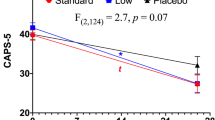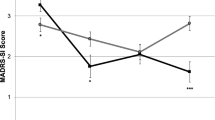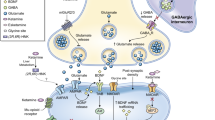Abstract
This study is the first randomized controlled trial to test the effects of ketamine in Borderline Personality Disorder (BPD). BPD remains undertreated in the community and no medication has FDA approval for this indication. People with BPD experience chronic mood disturbances with depressed mood, suicidal ideation, and severe social difficulties. In this double-blind, randomized controlled pilot study, we tested the effects of one infusion of ketamine (0.5 mg/kg, n = 10) or the psychoactive comparator drug midazolam (0.04 mg/kg, n = 12) in adults with BPD. Infusions were well tolerated in both groups. Dissociative symptoms during infusion were more intense with ketamine than midazolam (t(12.3) = 3.61, p = 0.01), but they resolved by 40 min after infusion in both groups. Post-infusion adverse events were at the expected low levels in both groups. For our primary outcome measure of suicidal ideation and our secondary outcome measure of depression, we found numerical reduction but not significant group or group x timepoint difference (p > 0.05). For our secondary outcome measures of anxiety and BPD symptoms, we did not observe group or group x timepoint differences. There was a group x timepoint effect for socio-occupational functioning (F(1,20.12) = 5.16, p = 0.03, at Day 14, ketamine group showed more improvement than midazolam group). An exploratory analysis revealed that improvement in socio-occupational functioning was correlated with improvement in depression in the ketamine group (r(8) = 0.65, p = 0.04) but not midazolam group (r(9) = 0.41, p = 0.216). This pilot study provides the first randomized controlled evidence of the effects of antidepressant-dosed ketamine in people with BPD. Our results provide reason for optimism that antidepressant-dosed ketamine will be well-tolerated in larger studies and may provide clinical benefit for mood symptoms and related impairments in people with BPD.
This is a preview of subscription content, access via your institution
Access options
Subscribe to this journal
Receive 13 print issues and online access
$259.00 per year
only $19.92 per issue
Buy this article
- Purchase on Springer Link
- Instant access to full article PDF
Prices may be subject to local taxes which are calculated during checkout



Similar content being viewed by others
References
Masland SR, Price D, MacDonald J, Finch E, Gunderson J, Choi-Kain L. Enduring effects of one-day training in good psychiatric management on clinician attitudes about borderline personality disorder. J Nerv Ment Dis. 2018;206:865–9. https://doi.org/10.1097/NMD.0000000000000893
Comtois KA, Carmel A. Borderline personality disorder and high utilization of inpatient psychiatric hospitalization: concordance between research and clinical diagnosis. J Behav Health Serv Res. 2016;43:272–80. https://doi.org/10.1007/s11414-014-9416-9
Paris J. Suicidality in borderline personality disorder. Medicina. 2019;55:223 https://doi.org/10.3390/medicina55060223
Storebo OJ, Stoffers-Winterling JM, Vollm BA, Kongerslev MT, Mattivi JT, Jorgensen MS, et al. Psychological therapies for people with borderline personality disorder. Cochrane Database Syst Rev. 2020;5:CD012955 https://doi.org/10.1002/14651858.CD012955.pub2
Binks CA, Fenton M, McCarthy L, Lee T, Adams CE, Duggan C. Pharmacological interventions for people with borderline personality disorder. Cochrane Database Syst Rev. 2006:CD005653. https://doi.org/10.1002/14651858.CD005653
McIntyre RS, Rosenblat JD, Nemeroff CB, Sanacora G, Murrough JW, Berk M, et al. Synthesizing the evidence for Ketamine and Esketamine in treatment-resistant depression: an international expert opinion on the available evidence and implementation. Am J Psychiatry. 2021;178:383–99. https://doi.org/10.1176/appi.ajp.2020.20081251
Nandan NK, Soni PK, Parsaik A, Hashmi A. “Esketamine” in borderline personality disorder: a look beyond suicidality. Cureus. 2022;14:e24632 https://doi.org/10.7759/cureus.24632
Chen KS, Dwivedi Y, Shelton RC. The effect of IV ketamine in patients with major depressive disorder and elevated features of borderline personality disorder. J Affect Disord. 2022;315:13–16. https://doi.org/10.1016/j.jad.2022.07.054
Bloch MH, Wasylink S, Landeros-Weisenberger A, Panza KE, Billingslea E, Leckman JF, et al. Effects of ketamine in treatment-refractory obsessive-compulsive disorder. Biol Psychiatry. 2012;72:964–70. https://doi.org/10.1016/j.biopsych.2012.05.028
Abdallah CG, Roache JD, Gueorguieva R, Averill LA, Young-McCaughan S, Shiroma PR, et al. Dose-related effects of ketamine for antidepressant-resistant symptoms of posttraumatic stress disorder in veterans and active duty military: a double-blind, randomized, placebo-controlled multi-center clinical trial. Neuropsychopharmacology. 2022;47:1574–81. https://doi.org/10.1038/s41386-022-01266-9
Feder A, Costi S, Rutter SB, Collins AB, Govindarajulu U, Jha MK, et al. A randomized controlled trial of repeated ketamine administration for chronic posttraumatic stress disorder. Am J Psychiatry. 2021;178:193–202. https://doi.org/10.1176/appi.ajp.2020.20050596
Rodriguez CI, Kegeles LS, Levinson A, Feng T, Marcus SM, Vermes D, et al. Randomized controlled crossover trial of ketamine in obsessive-compulsive disorder: proof-of-concept. Neuropsychopharmacology. 2013;38:2475–83. https://doi.org/10.1038/npp.2013.150
Wilkinson ST, Farmer C, Ballard ED, Mathew SJ, Grunebaum MF, Murrough JW, et al. Impact of midazolam vs. saline on effect size estimates in controlled trials of ketamine as a rapid-acting antidepressant. Neuropsychopharmacology. 2019;44:1233–8. https://doi.org/10.1038/s41386-019-0317-8
Wilkowska A, Wiglusz MS, Jakuszkowiak-Wojten K, Cubala WJ. Ketamine and Lamotrigine combination in psychopharmacology: systematic review. Cells. 2022;11:645 https://doi.org/10.3390/cells11040645
Chiu CT, Scheuing L, Liu G, Liao HM, Linares GR, Lin D, et al. The mood stabilizer lithium potentiates the antidepressant-like effects and ameliorates oxidative stress induced by acute ketamine in a mouse model of stress. Int J Neuropsychopharmacol. 2014;18:pyu102 https://doi.org/10.1093/ijnp/pyu102
Price JB, Yates CG, Morath BA, Van De Wakker SK, Yates NJ, Butters K, et al. Lithium augmentation of ketamine increases insulin signaling and antidepressant-like active stress coping in a rodent model of treatment-resistant depression. Transl Psychiatry. 2021;11:598 https://doi.org/10.1038/s41398-021-01716-w
Motaghinejad M, Motevalian M, Fatima S, Beiranvand T, Mozaffari S. Topiramate via NMDA, AMPA/kainate, GABA(A) and Alpha2 receptors and by modulation of CREB/BDNF and Akt/GSK3 signaling pathway exerts neuroprotective effects against methylphenidate-induced neurotoxicity in rats. J Neural Transm. 2017;124:1369–87. https://doi.org/10.1007/s00702-017-1771-2
First MB, Spitzer, RL, Gibbon, M, Williams, JBW Structured Clinical Interview for DSM-IV-TR Axis I Disorders-Patient Edition. In: Institute BRDNYSP, editor. New York, New York 2007.
Zanarini M, Frankenburg FR, Chauncey DL, Gunderson JG. The diagnostic interview for personality disorders: Interrater and test-retest reliability. Compr Psychiatry. 1987;28:467–580.
Zanarini MC, Gunderson JG, Frankenburg FR, Chauncey DL. The revised diagnostic interview for borderlines: discriminating BPD from other axis II disorders. J Pers Disord. 1989;3:10–8.
Sheehan DV, Lecrubier Y, Sheehan KH, Amorim P, Janavs J, Weiller E, et al. The Mini-International Neuropsychiatric Interview (M.I.N.I.): the development and validation of a structured diagnostic psychiatric interview for DSM-IV and ICD-10. J Clin Psychiatry. 1998;59(Suppl 20):22–33. quiz 4-57
Overall JE The brief psychiatric rating scale in psychopharmacology research. 1974.
Bremner JD, Krystal JH, Putnam FW, Southwick SM, Marmar C, Charney DS, et al. Measurement of dissociative states with the Clinician-Administered Dissociative States Scale (CADSS). J Trauma Stress. 1998;11:125–36. https://doi.org/10.1023/A:1024465317902
Beck AT, Kovacs M, Weissman A. Assessment of suicidal intention: the Scale for Suicide Ideation. J Consul Clin Psychol. 1979;47:343.
Beck AT, Ward CH, Mendelson M, Mock J, Erbaugh J. An inventory for measuring depression. Arch Gen Psychiatry. 1961;4:561–71.
Beck AT, Epstein N, Brown G, Steer RA. An inventory for measuring clinical anxiety: psychometric properties. J Consult Clin Psychol. 1988;56:893–7.
Zanarini MC, Weingeroff JL, Frankenburg FR, Fitzmaurice GM. Development of the self-report version of the Zanarini Rating Scale for Borderline Personality Disorder. Personal Ment Health. 2015;9:243–9. https://doi.org/10.1002/pmh.1302
Weissman MM, Bothwell S. Assessment of social adjustment by patient self-report. Arch Gen Psychiatry. 1976;33:1111–5.
Beck AT, Steer RA, Brown GK. Manual for the Beck Depression Inventory-II. San Antonio, TX: Psychological Corporation;; 1996.
Beck AT, Brown GK, Steer RA. Psychometric characteristics of the Scale for Suicide Ideation with psychiatric outpatients. Behav Res Ther. 1997;35:1039–46. https://doi.org/10.1016/s0005-7967(97)00073-9
Zanarini MC, Vujanovic AA, Parachini EA, Boulanger JL, Frankenburg FR, Hennen J. Zanarini Rating Scale for Borderline Personality Disorder (ZAN-BPD): a continuous measure of DSM-IV borderline psychopathology. J Pers Disord. 2003;17:233–42. https://doi.org/10.1521/pedi.17.3.233.22147
Mello RP, Echegaray MVF, Jesus-Nunes AP, Leal GC, Magnavita GM, Vieira F, et al. Trait dissociation as a predictor of induced dissociation by ketamine or esketamine in treatment-resistant depression: Secondary analysis from a randomized controlled trial. J Psychiatr Res. 2021;138:576–83. https://doi.org/10.1016/j.jpsychires.2021.05.014
Perez S, Lorca F, Marco JH. “Dissociation, posttraumatic stress symptoms, emotional dysregulation, and invalidating environments as correlates of NSSI in borderline personality disorder patients”. J Trauma Dissociation. 2020;21:520–35. https://doi.org/10.1080/15299732.2020.1719262
Ebner-Priemer UW, Mauchnik J, Kleindienst N, Schmahl C, Peper M, Rosenthal MZ, et al. Emotional learning during dissociative states in borderline personality disorder. J Psychiatry Neurosci. 2009;34:214–22.
Kleindienst N, Limberger MF, Ebner-Priemer UW, Keibel-Mauchnik J, Dyer A, Berger M, et al. Dissociation predicts poor response to Dialectial Behavioral Therapy in female patients with Borderline Personality Disorder. J Pers Disord. 2011;25:432–47. https://doi.org/10.1521/pedi.2011.25.4.432
Kleindienst N, Priebe K, Gorg N, Dyer A, Steil R, Lyssenko L, et al. State dissociation moderates response to dialectical behavior therapy for posttraumatic stress disorder in women with and without borderline personality disorder. Eur J Psychotraumatol. 2016;7:30375 https://doi.org/10.3402/ejpt.v7.30375
Arntz A, Stupar-Rutenfrans S, Bloo J, van Dyck R, Spinhoven P. Prediction of treatment discontinuation and recovery from Borderline Personality Disorder: Results from an RCT comparing Schema Therapy and Transference Focused Psychotherapy. Behav Res Ther. 2015;74:60–71. https://doi.org/10.1016/j.brat.2015.09.002
Gunderson JG, Herpertz SC, Skodol AE, Torgersen S, Zanarini MC. Borderline personality disorder. Nat Rev Dis Prim. 2018;4:18029 https://doi.org/10.1038/nrdp.2018.29
Stoffers-Winterling J, Storebo OJ, Lieb K. Pharmacotherapy for borderline personality disorder: an update of published, unpublished and ongoing studies. Curr Psychiatry Rep. 2020;22:37 https://doi.org/10.1007/s11920-020-01164-1
Feder A, Parides MK, Murrough JW, Perez AM, Morgan JE, Saxena S, et al. Efficacy of intravenous ketamine for treatment of chronic posttraumatic stress disorder: a randomized clinical trial. JAMA Psychiatry. 2014;71:681–8. https://doi.org/10.1001/jamapsychiatry.2014.62
Rizk MM, Choo TH, Galfalvy H, Biggs E, Brodsky BS, Oquendo MA, et al. Variability in suicidal ideation is associated with affective instability in suicide attempters with borderline personality disorder. Psychiatry. 2019;82:173–8. https://doi.org/10.1080/00332747.2019.1600219
Links PS, Eynan R, Heisel MJ, Barr A, Korzekwa M, McMain S, et al. Affective instability and suicidal ideation and behavior in patients with borderline personality disorder. J Pers Disord. 2007;21:72–86. https://doi.org/10.1521/pedi.2007.21.1.72
Kleiman EM, Turner BJ, Fedor S, Beale EE, Picard RW, Huffman JC, et al. Digital phenotyping of suicidal thoughts. Depress Anxiety. 2018;35:601–8. https://doi.org/10.1002/da.22730
Bloomfield-Clagett B, Ballard ED, Greenstein DK, Wilkinson ST, Grunebaum MF, Murrough JW, et al. A participant-level integrative data analysis of differential placebo response for suicidal ideation and non-suicidal depressive symptoms in clinical trials of intravenous Racemic Ketamine. Int J Neuropsychopharmacol. 2022;25:827–38. https://doi.org/10.1093/ijnp/pyac055
Gunderson JG, Choi-Kain LW. Medication management for patients with borderline personality disorder. Am J Psychiatry. 2018;175:709–11. https://doi.org/10.1176/appi.ajp.2018.18050576
Fineberg SK, Gupta S, Leavitt J. Collaborative deprescribing in borderline personality disorder: a narrative review. Harv Rev Psychiatry. 2019;27:75–86. https://doi.org/10.1097/HRP.0000000000000200
Neustadter ES, Fineberg SK, Leavitt J, Carr MM, Corlett PR. Induced illusory body ownership in borderline personality disorder. Neurosci Conscious. 2019;2019:niz017 https://doi.org/10.1093/nc/niz017
Berman RM, Cappiello A, Anand A, Oren DA, Heninger GR, Charney DS, et al. Antidepressant effects of ketamine in depressed patients. Biol Psychiatry. 2000;47:351–4. https://doi.org/10.1016/s0006-3223(99)00230-9
Wlodarczyk A, Cubala WJ, Galuszko-Wegielnik M, Szarmach J. Dissociative symptoms with intravenous ketamine in treatment-resistant depression exploratory observational study. Medicine. 2021;100:e26769 https://doi.org/10.1097/MD.0000000000026769
Zanarini MC, Frankenburg FR, Reich DB, Fitzmaurice G. Attainment and stability of sustained symptomatic remission and recovery among patients with borderline personality disorder and axis II comparison subjects: a 16-year prospective follow-up study. Am J Psychiatry. 2012;169:476–83. https://doi.org/10.1176/appi.ajp.2011.11101550
Zanarini MC, Temes CM, Frankenburg FR, Reich DB, Fitzmaurice GM. Description and prediction of time-to-attainment of excellent recovery for borderline patients followed prospectively for 20 years. Psychiatry Res. 2018;262:40–5. https://doi.org/10.1016/j.psychres.2018.01.034
Dean RL, Hurducas C, Hawton K, Spyridi S, Cowen PJ, Hollingsworth S, et al. Ketamine and other glutamate receptor modulators for depression in adults with unipolar major depressive disorder. Cochrane Database Syst Rev. 2021;9:CD011612 https://doi.org/10.1002/14651858.CD011612.pub3
Phillips JL, Norris S, Talbot J, Birmingham M, Hatchard T, Ortiz A, et al. Single, repeated, and maintenance ketamine infusions for treatment-resistant depression: a randomized controlled trial. Am J Psychiatry. 2019;176:401–9. https://doi.org/10.1176/appi.ajp.2018.18070834
Acknowledgements
We are very grateful to the people who volunteered as study participants for this project. A number of people in our lab helped with recruitment for this project. We particularly wish to acknowledge Nyla Conaway, Max Crosland-Wood, Rena Linden, Dan McGlade, Erica Robinson, and Esther Teo. We are also very grateful to the supportive and excellent team of scheduling staff and nurses at the Yale Center for Clinical Investigation Hospital Research Unit. We thank Kaitlin Maciejewski from the Yale Center for Analytic Science for advice on statistical approaches. We also thank Michael Bloch and Naomi Driesen for advice in project planning. Pharmacokinetic sample processing for this study was performed by the Biomarkers Core Laboratory at the Irving Institute for Clinical and Translational Research, home to Columbia University’s Clinical and Translational Science Award Program hub.
Author information
Authors and Affiliations
Contributions
We describe author contributions here using the CRediT system (https://www.elsevier.com/authors/policies-and-guidelines/credit-author-statement). SF: conceptualization, methodology, formal analysis, investigation, visualization, writing of original and revised drafts. Supervision, project administration, and funding acquisition. EC: project administration, investigation (interviews and blind raters), formal analysis, and visualization. RST: project administration, investigation (interviews and blind ratings), formal analysis, and visualization. KD: project administration, investigation (interviews and blind ratings). EN: methodology, investigation (interviews and blind raters), data curation, writing—edited manuscript. Madison Sakheim: methodology, data curation. Kaylee Null: data curation, investigation (interviews). DT-D: investigation (extensive interviewing). JR: formal analysis, writing—edited manuscript. GP: formal analysis, writing—edited manuscript. Jessica Peters: formulation, formal analysis, and writing – edited manuscript. PRC: provided close mentorship on conceptualization and funding acquisition. JHK: mentorship on conceptualization and funding acquisition, close mentorship on formal analysis and manuscript writing.
Corresponding author
Ethics declarations
Competing interests
SKF discloses work with the pharmaceutical company Boehringer Ingelheim as site PI for a multinational clinical trial and for consulting on advisory boards (< $10,000 in 2022). PRC is co-founder of Tetricus Labs. JHK consults for Aptinyx Inc., Biogen Idec MA, Bionomics Ltd., Boehringer Ingelheim International, Clearmind Medicine, Inc., Cybin IRL, Enveric Biosciences, Epiodyne, Inc., EpiVario, Inc., Janssen Research & Development, Jazz Pharmaceuticals, Inc., Otsuka America Pharmaceutical, Inc., Perception Neuroscience, Inc., Praxis Precision Medicines, Inc., Spring Care, Inc., and Sunovion Pharmaceuticals, Inc.; is a scientific advisor of Biohaven Pharmaceuticals, BioXcel Therapeutics, Inc. (Clinical Advisory Board), Cerevel Therapeutics, LLC, Delix Therapeutics, Inc., Eisai, Inc., EpiVario, Inc., Freedom Biosciences, Inc., Jazz Pharmaceuticals, Inc., Numara Therapeutics, Inc., Neurocrine Biosciences, Inc., Novartis Pharmaceuticals Corporation, Perception Neuroscience, Inc., Praxis Precision Medicines, Inc., PsychoGenics, Inc., Takeda Industries, Tempero Bio, Inc., and Terran Biosciences, Inc.; holds stock or stock options with Biohaven Pharmaceuticals, Clearmind Medicine, Inc., Spring Care, Inc., EpiVario, Inc., Neumora Therapeutics, Inc., Tempero Bio, Inc., and Terran Biosciences, Inc.; and is editor of Biological Psychiatry. JHK was also awarded the following patents: (i) Seibyl JP, Krystal JH, Charney DS. Dopamine and Noradrenergic Reuptake Inhibitors in Treatment of Schizophrenia. U.S. Patent No. 5447948. September 5, 1995; (ii) Vladimir C, Krystal JH, Sanacora G. Glutamate Modulating Agents in the Treatment of Mental Disorders. U.S. Patent No. 8778979 B2. Patent Issue Date July 15, 2014. U.S. Patent Application No. 15/695,164. Filing Date September 5, 2017; (iii) Charney D, Krystal JH, Manji H, Matthew S, Zarate C. Intranasal Administration of Ketamine to Treat Depression. U.S. Patent Application No. 14/197767 filed on March 5, 2014. U.S. Application or Patent Cooperation Treaty International Application No. 14/306382 filed on June 17, 2014; (iv) Zarate C, Charney DS, Manji HK, Mathew SJ, Krystal JH, Department of Veterans Affairs. Methods for Treating Suicidal Ideation. Patent Application No. 14/197767 filed on March 5, 2014, by Yale University Office of Cooperative Research; (v) Arias A, Petrakis I, Krystal JH. Composition and Methods to Treat Addiction. Provisional Use Patent Application No. 61/973/961. April 2, 2014. Filed by Yale University Office of Cooperative Research; (vi) Chekroud A, Gueorguieva R, Krystal JH. Treatment Selection for Major Depressive Disorder. U.S. Patent and Trademark Office Docket No. Y0087.70116US00. Filed June 3, 2016. Provisional patent submission by Yale University; (vii) Gihyun Y, Petrakis I, Krystal JH. Compounds, Compositions, and Methods for Treating or Preventing Depression and Other Diseases. U.S. Provisional Patent Application No. 62/444552. Filed on January 10, 2017 by Yale University Office of Cooperative Research OCR 7088 US01; (viii) Abdallah C, Krystal JH, Duman R, Sanacora G. Combination Therapy for Treating or Preventing Depression or Other Mood Diseases. U.S. Provisional Patent Application No. 62/719935. Filed on August 20, 2018, by Yale University Office of Cooperative Research OCR 7451 US01. (ix) Krystal, JH, Pearlson, G, O’Malley, S, Potenza, M, Gasparini, F, Gomez-Mancilla, B, Malaterre, V. Mavoglurant in treating gambling and gaming disorders. U.S. Provisional Patent Application No. 63/125,181filed on December 14, 2020 by Yale University Office of Cooperative Research OCR 8065 US00. AstraZeneca Pharmaceuticals provides the drug, Saracatinib, for research related to NIAAA grant “Center for Translational Neuroscience of Alcoholism [CTNA-5]”. Novartis provides the drug, Mavoglurant, for research related to NIAAA grant “Center for Translational Neuroscience of Alcoholism [CTNA-5]”. Cerevel provides the drug PF-06412562 for A Translational and Neurocomputational Evaluation of a D1R Partial Agonist for Schizophrenia (1 U01 MH121766-01). EYC, RST, KD, EN, MS, KN, DTD, JR, GFP, and JRP declare no competing interests.
Additional information
Publisher’s note Springer Nature remains neutral with regard to jurisdictional claims in published maps and institutional affiliations.
Supplementary information
Rights and permissions
Springer Nature or its licensor (e.g. a society or other partner) holds exclusive rights to this article under a publishing agreement with the author(s) or other rightsholder(s); author self-archiving of the accepted manuscript version of this article is solely governed by the terms of such publishing agreement and applicable law.
About this article
Cite this article
Fineberg, S.K., Choi, E.Y., Shapiro-Thompson, R. et al. A pilot randomized controlled trial of ketamine in Borderline Personality Disorder. Neuropsychopharmacol. 48, 991–999 (2023). https://doi.org/10.1038/s41386-023-01540-4
Received:
Revised:
Accepted:
Published:
Issue Date:
DOI: https://doi.org/10.1038/s41386-023-01540-4
This article is cited by
-
Ketamine and rapid antidepressant action: new treatments and novel synaptic signaling mechanisms
Neuropsychopharmacology (2024)



